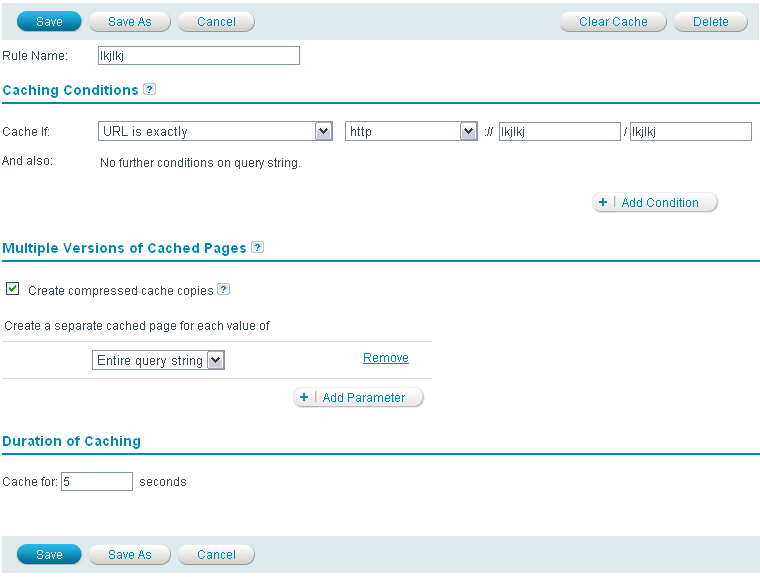Edit Rule (Caching)
The Edit Rule page is accessed from Rule Management | Caching, by clicking  or by clicking Edit next to a specific rule.
or by clicking Edit next to a specific rule.

Caching Information
Rule Name - The unique name you give the rule. This name appears in the list in Rule Management | Caching.
Caching Conditions
Define a Web page to cache by building the URL in the entry fields. Use the URL of the page you want to cache and define how long to cache the page and the caching format.
You can also add conditions that can further pinpoint what to cache. You can choose to cache when "all of the following are true" - i.e. all the conditions occur or when "at least one is true" - i.e. trigger caching when at least one of the conditions occur.
The conditions that can be applied to a rule are:
- Get - This refers to the parameters after the' ?' in the URL. Use this condition to cache specific URLs, for example, caching a page with the URL: http://localhost:81/index.php?page=gallery. When the rule is applied, only the specified page is cached out of all the pages on http://localhost:81/index.php.
- Server - This global variable can be used to determine server (Apache) parameters. The most common usage of SERVER variables is to use the headers that are sent in the request (i.e., variables that begin with HTTP - for example, HTTP_USER_AGENT), that can be used to define rules based on browser type.
- Session - This global variable originates from an active session and can be used to cache (or specifically not cache) scripts if a specific variable exists (or has a value) in the active session.
- Cookie - This global variable stores information that is sent to the server from the browser. A cookie can be used to cache banners such as "Related Search" banners (which usually take time to compile), by displaying pre-cached banners according to the information in the cookies.
Note:
You can only cache URLs that display static content with a long rendering time or dynamic content that you want to display statically according to time/parameters.
Multiple Versions of Cached Pages
- Create Compressed Cache Copies - This option allows you to disable the creation of a gzip-compressed version of each cached page as long as it is larger than 1KB. You should normally leave this option checked.
- Create a separate cached page for each value of - If you want to manage a different cache version according to an additional parameter, you can choose to create a separate cached page for all the caching conditions (Entire Query String) or add one at a time each separate query string (Get, Server, Session or Cookie).
Duration of Caching
Define the cache's lifetime
- Lifetime - The duration of the cache content, after the set amount of seconds the cached content will be replaced by new content.
For more information and rule examples see: .
Note:
URL caching conditions can be defined using Perl-Compatible Regular Expressions (PCRE). The pattern syntax is the same as the syntax used by PHP's preg_match() and other preg_* functions. For more information on the PCRE syntax, see http://devzone.zend.com/manual/reference.pcre.pattern.syntax.html.
![]() or by clicking Edit next to a specific rule.
or by clicking Edit next to a specific rule.